Top 10 Probiotic Strains for Optimal Gut Health: Science-Backed Benefits
Discover the most researched probiotic bacteria that support digestion, immunity, and overall wellness
Your gut contains trillions of microorganisms that work together to keep you healthy. Among these microscopic helpers, certain probiotic strains stand out for their exceptional ability to support digestion, strengthen your immune system, and even improve your mood. But with so many probiotic options available, which ones really work?
Science has identified specific bacterial strains that offer measurable health benefits. These probiotics don't just survive the journey through your digestive system—they actively contribute to your wellbeing in remarkable ways. From reducing bloating and improving bowel regularity to supporting heart health and reducing inflammation, the right probiotic strains can make a real difference in how you feel every day.
This comprehensive guide explores ten of the most thoroughly researched probiotic strains available today. Each one has been studied in clinical trials and shown to provide genuine health benefits. Whether you're looking to improve your digestion, boost your immune system, or simply maintain optimal gut health, understanding these powerful microorganisms is the first step toward taking control of your wellness.
Key Takeaways
- Probiotic diversity matters: Different strains provide different benefits, which is why multi-strain formulations often outperform single-strain products
- Clinical evidence is essential: The strains featured in this guide have been validated through rigorous scientific research and human clinical trials
- Consistency delivers results: Regular daily supplementation with quality probiotics produces the best outcomes for gut health
- Soil-based organisms offer unique advantages: Spore-forming probiotics like Bacillus species survive stomach acid better than traditional strains
- Prebiotics amplify probiotic benefits: Combining probiotics with organic prebiotic fibers helps beneficial bacteria thrive in your digestive system
- Quality and purity matter: Choose probiotics free from harmful fillers and flow agents that can reduce effectiveness
1. Lactobacillus acidophilus: The Digestive Champion
Lactobacillus acidophilus stands as one of the most extensively studied probiotic bacteria in scientific literature. Originally isolated from infant feces in 1900, this gram-positive bacterium has been the subject of hundreds of clinical trials examining its effects on human health.[1]
What makes L. acidophilus particularly effective is its exceptional ability to survive the harsh acidic environment of your stomach. According to research published in Probiotics and Antimicrobial Proteins, L. acidophilus demonstrates "remarkable tolerance to both low pH in the stomach and high pH as a result of the presence of bile salts in the duodenum."[2] This survival ability allows it to reach your intestines alive and ready to work.
Digestive Health Benefits
A controlled clinical trial of 137 patients with chronic diarrhea found that L. acidophilus significantly reduced bowel movement frequency and improved stool consistency compared to other probiotic treatments.[3] The study demonstrated marked improvements in abdominal pain, bloating, and rectal urgency after just two weeks of supplementation.
Research has also confirmed L. acidophilus helps with antibiotic-associated diarrhea. When antibiotics disrupt your normal gut bacteria, L. acidophilus can help restore balance and reduce digestive discomfort.[4]
If you're currently taking antibiotics or recovering from a course, see our dedicated guide on the best probiotics for antibiotic recovery for strain-specific recommendations.
Immune System Support
Beyond digestion, L. acidophilus plays a vital role in immune function. Studies show this probiotic can enhance both antibody-mediated and cell-mediated immune responses. In one study, immunocompromised mice treated with L. acidophilus NCFM showed higher serum levels of IgG, IgA, and IgM antibodies, which helped reduce the severity of fungal infections.[5]
Bone Health Connection
Emerging research reveals unexpected benefits of L. acidophilus for bone health. A 12-week randomized controlled trial with postmenopausal women found that daily L. acidophilus supplementation positively affected calcium status and bone metabolism biomarkers.[6] This suggests L. acidophilus may help mitigate osteoporosis risk through its effects on the gut-bone axis.
Did You Know?
L. acidophilus can survive stomach acid so well that researchers have detected it in fecal samples up to 10 days after ingestion stops. This persistence allows it to provide longer-lasting benefits compared to less resilient probiotic strains.[1]
2. Bifidobacterium lactis: The Immune Modulator
Bifidobacterium lactis (also known as B. animalis subsp. lactis) represents one of the most clinically studied Bifidobacterium species. This probiotic naturally inhabits your large intestine, where it plays crucial roles in immune function, digestive health, and metabolic wellness.
Constipation Relief and Digestive Comfort
Multiple clinical trials have examined B. lactis for constipation management. A 2018 double-blind, placebo-controlled study found that 28 days of B. lactis HN019 supplementation improved colonic transit time and gastrointestinal symptoms in adults with functional constipation.[7] Participants reported better bowel movement frequency, improved stool consistency, and overall digestive comfort.
However, it's important to note that probiotic research shows varying results based on dosage, duration, and individual microbiome composition. A more recent 2024 trial with different parameters showed mixed results, highlighting that effectiveness depends on multiple factors including the specific strain used and study population.[8]
Bloating and Gas Reduction
A randomized clinical trial published in Alimentary Pharmacology & Therapeutics tested B. lactis combined with L. acidophilus in patients with functional bowel disorders. The study found significant improvements in abdominal bloating at four weeks compared to placebo.[9] Participants taking the probiotic combination reported reduced discomfort and better quality of life.
Cardiovascular Benefits
Fascinating research has uncovered connections between B. lactis and heart health. A six-month randomized, double-blind trial with coronary artery disease patients found that B. lactis Probio-M8, when given alongside conventional medication, significantly improved Seattle Angina Questionnaire scores compared to medication alone.[10] The probiotic appeared to work through modulation of the gut-heart axis, demonstrating how gut bacteria influence cardiovascular function.
Lactose Digestion Support
For people with lactose intolerance, B. lactis offers practical benefits. Two crossover clinical trials demonstrated that B. lactis Bi-07 supported lactose digestion when consumed simultaneously with a lactose challenge. The probiotic's high lactase activity helped reduce symptoms in individuals with lactose intolerance.[11]
3. Bacillus coagulans: The Resilient Spore-Former
Unlike most probiotics, Bacillus coagulans is a spore-forming bacterium. This unique characteristic gives it exceptional survival advantages. The spores act like protective shields, allowing B. coagulans to withstand extreme conditions including high stomach acid, heat, and even manufacturing processes that would destroy traditional probiotics.
As a review in Journal of Applied Microbiology explains, "B. coagulans has become a focus of research due to its high tolerance of extreme environments and probiotic characteristics."[12] Once the spores reach your intestines, they germinate into active bacteria ready to provide health benefits.
Irritable Bowel Syndrome Relief
Multiple clinical trials have demonstrated B. coagulans' effectiveness for IBS. A randomized, double-blind study of 136 adults with IBS found that eight weeks of B. coagulans Unique IS2 supplementation significantly restored complete spontaneous bowel movements and reduced abdominal pain compared to placebo.[13]
The study also showed improvements in bloating, incomplete evacuation, urgency, straining, and stool consistency—addressing the full spectrum of IBS symptoms. Researchers concluded that B. coagulans was "efficacious in restoration of CSBM, reduction of abdominal pain and other IBS associated symptoms in adults."[13]
Gas and Bloating Reduction
A multicenter study published in Nutrients examined B. coagulans MTCC 5856 (LactoSpore) in 70 adults with functional gas and bloating. After four weeks, the probiotic group showed significant improvements, with gastrointestinal symptom scores dropping from 8.91 to 3.06 (p < 0.001), while the placebo group saw minimal change.[14] Participants reported better overall digestive comfort and quality of life.
Mental Health and Digestive Wellness
Remarkably, B. coagulans may support both gut and brain health simultaneously. A randomized, double-blind pilot study found that B. coagulans MTCC 5856 provided significant benefits for patients with both major depressive disorder and IBS. Participants experienced improvements in depression scales, IBS quality of life measures, and reductions in inflammatory biomarkers.[15]
Protein Absorption Enhancement
Research reveals that B. coagulans can improve nutrient absorption. Studies show B. coagulans GBI-30, 6086 increased essential amino acid absorption, including leucine absorption by 20%.[16] This makes it particularly valuable for athletes and anyone looking to maximize the benefits of protein consumption.
Did You Know?
The spore-forming ability of B. coagulans means it doesn't require refrigeration like many other probiotics. The spores remain viable at room temperature for extended periods, making B. coagulans an ideal choice for travel or situations where refrigeration isn't available.
4. Lactobacillus plantarum: The Versatile Gut Guardian
Lactobacillus plantarum is found naturally in many fermented foods including sauerkraut, kimchi, and pickles. This versatile probiotic has earned GRAS (Generally Recognized as Safe) status and demonstrates remarkable adaptability in various environments.
What sets L. plantarum apart is its exceptional ability to adhere to intestinal walls. Research published in Frontiers in Microbiology notes that L. plantarum "is capable of successfully colonizing and inhabiting the human gastrointestinal system" better than many other probiotic species.[17] This adhesion capability is essential for probiotics to exert their health benefits.
Inflammatory Bowel Disease Support
Clinical trials have demonstrated L. plantarum's potential for managing inflammatory bowel conditions. Research shows this probiotic can help modulate visceral sensitivity—a main cause of abdominal pain in IBS patients—and regulate intestinal motility by directly acting on the intestinal nervous system.[18]
A randomized, double-blind study in patients with ulcerative colitis found that probiotic preparations containing L. plantarum helped improve symptoms and quality of life. The strain's anti-inflammatory properties contribute to these beneficial effects.[19]
Immune Function Enhancement
L. plantarum's immunomodulatory effects are well-documented. A clinical study of 171 adults found that daily consumption of yogurt containing L. plantarum for eight weeks significantly stimulated immune function. Participants showed increased activity of natural killer cells—white blood cells that destroy diseased and infected cells.[20]
Gut-Brain Axis Benefits
Emerging research reveals L. plantarum's potential as a psychobiotic—a probiotic that influences mental health through the gut-brain axis. Studies indicate that certain L. plantarum strains can produce or stimulate the production of neurotransmitters like GABA and serotonin, potentially reducing symptoms of depression and anxiety.[18]
A randomized controlled trial found that L. plantarum supplementation helped alleviate chronic diarrhea while also showing effects on inflammation regulation and gut microbiota composition that could influence mood.[21]
Antimicrobial Activity
L. plantarum produces various antimicrobial compounds that help protect your gut from harmful bacteria. Research shows it can inhibit growth of pathogenic bacteria like E. coli, Pseudomonas aeruginosa, and Staphylococcus aureus through production of lactic acid, acetic acid, and bacteriocins.[22]
5. Bifidobacterium longum: The Original Colonizer
Bifidobacterium longum is one of the first beneficial bacteria to colonize your gut when you're born. It remains an important resident throughout your life, playing crucial roles in digestion, immune function, and even mental health.
This probiotic excels at breaking down complex carbohydrates that your body can't digest on its own. As B. longum ferments these compounds, it produces short-chain fatty acids—especially butyrate—that nourish your intestinal cells and reduce inflammation.
Digestive Comfort
B. longum helps reduce common digestive complaints like bloating, gas, and abdominal discomfort. Clinical research demonstrates its ability to improve bowel regularity and enhance overall digestive function. It's particularly effective when combined with other probiotic strains in multi-strain formulations.
Immune System Development
B. longum plays a vital role in training your immune system. It helps the body distinguish between harmless substances and genuine threats, reducing the likelihood of allergic reactions. This immune-educating function is especially important during infancy and early childhood when the immune system is still developing.
Stress and Anxiety Reduction
Research published in Nutrients suggests B. longum may help alleviate feelings of anxiety and depression through its effects on the gut-brain axis. The probiotic influences production of neurotransmitters and may reduce stress-related inflammation that contributes to mood disorders.[18]
Vitamin Production
B. longum synthesizes several B vitamins your body needs, including folate (B9), which supports cell division and DNA synthesis. This vitamin-producing capability makes B. longum valuable for maintaining optimal nutritional status.
6. Lactobacillus rhamnosus: The Allergy Fighter
Lactobacillus rhamnosus has gained recognition for its exceptional adhesion properties and ability to survive passage through the digestive system. This persistence allows L. rhamnosus to establish itself in your gut and provide sustained benefits.
Diarrhea Prevention and Treatment
L. rhamnosus is one of the most studied probiotics for preventing and treating various types of diarrhea. Clinical evidence shows it can reduce the duration and severity of acute diarrhea, particularly in children. It's also effective for preventing antibiotic-associated diarrhea when taken alongside antibiotic treatment.
Allergy and Eczema Reduction
Perhaps most remarkably, L. rhamnosus shows promise for reducing allergic conditions. Studies indicate that when mothers take L. rhamnosus during pregnancy and breastfeeding, their infants have lower rates of eczema development. The probiotic appears to influence immune system development in ways that reduce allergic responses.
Vaginal Health
L. rhamnosus naturally inhabits the vaginal microbiome, where it helps maintain a healthy pH balance and prevents overgrowth of harmful bacteria and yeast. Supplementation with L. rhamnosus may help prevent and treat bacterial vaginosis and yeast infections.
Weight Management Support
Emerging research suggests certain L. rhamnosus strains may support healthy weight management. While mechanisms aren't fully understood, studies indicate this probiotic may influence fat storage, appetite regulation, and metabolic function through its effects on gut bacteria composition.
To understand the specific strain differences and clinical applications—including anxiety support, weight loss in women, and antibiotic-associated diarrhea prevention—explore our comprehensive Lactobacillus rhamnosus benefits guide.
7. Lactobacillus casei: The Immune Booster
Lactobacillus casei thrives in various parts of your digestive system, from your mouth to your colon. This adaptability allows it to provide benefits throughout your entire gastrointestinal tract. It's commonly found in fermented dairy products like yogurt and kefir.
Digestive Health Support
L. casei helps maintain regular bowel movements and reduces diarrhea risk. Clinical studies show it can improve stool consistency, reduce abdominal discomfort, and support overall digestive function. The strain's ability to survive in different pH environments makes it particularly effective.
Immune Enhancement
Research demonstrates L. casei's ability to boost immune function by stimulating production of immune cells and antibodies. Regular supplementation may help reduce the frequency and duration of common infections like colds and flu.
Lactose Digestion
For people with lactose intolerance, L. casei offers practical benefits. It produces the enzyme lactase, which helps break down lactose (milk sugar). This can make dairy products easier to digest and reduce symptoms like bloating and gas.
Oral Health Benefits
Interestingly, L. casei may support oral health by competing with harmful bacteria in your mouth. Some research suggests it can help reduce cavity-causing bacteria and support healthy gums, though more studies are needed to confirm these effects.
8. Bifidobacterium bifidum: The Infant Essential
Bifidobacterium bifidum is one of the first bacteria to colonize infant intestines. It remains an important member of your gut microbiome throughout life, though its abundance typically decreases with age.
IBS Symptom Relief
Clinical research shows B. bifidum can significantly improve symptoms in people with irritable bowel syndrome. It helps reduce abdominal pain, bloating, and irregular bowel movements while improving overall quality of life for IBS sufferers.
Additionally, of all the strains evaluated for digestive conditions, B. infantis stands out for IBS specifically—a systematic review found it was the only strain among 13 tested to improve multiple IBS symptoms significantly.
Gut Barrier Protection
B. bifidum strengthens your intestinal lining by supporting production of mucus and tight junction proteins. This creates a robust barrier that prevents harmful substances from entering your bloodstream—a condition known as leaky gut when this barrier becomes compromised.
Immune Regulation
This probiotic helps balance your immune response, preventing both underactive immunity (which increases infection risk) and overactive immunity (which can lead to allergies and autoimmune conditions). B. bifidum achieves this balance by modulating inflammatory signals.
Vitamin Synthesis
Like other Bifidobacterium species, B. bifidum produces B vitamins that your body needs for energy production, nervous system function, and countless other metabolic processes. This vitamin production contributes to your overall nutritional status.
9. Lactobacillus reuteri: The Multi-Tasking Colonizer
Lactobacillus reuteri naturally inhabits various parts of the human body, including the digestive tract, urinary tract, and even breast milk. This versatile probiotic has gained significant attention for its remarkable ability to produce antimicrobial compounds and modulate immune function.
What makes L. reuteri particularly interesting is its production of reuterin, a powerful antimicrobial substance. Research published in Frontiers in Cellular and Infection Microbiology explains that "L. reuteri can secrete sufficient amounts of reuterin to achieve the desired antimicrobial effects" while requiring four to five times more reuterin to harm beneficial bacteria than pathogenic ones.[23] This selective antimicrobial activity allows L. reuteri to remove harmful invaders without disrupting your healthy gut bacteria.
Infant Colic Relief
One of L. reuteri's best-documented benefits is treating infantile colic. A prospective randomized study published in Pediatrics found that L. reuteri (ATCC 55730 strain) significantly reduced crying time in breastfed infants compared to simethicone.[24] Parents of colicky babies taking L. reuteri reported dramatic improvements in their infants' comfort and sleep patterns.
Diarrhea Management
Multiple clinical trials demonstrate L. reuteri's effectiveness for both preventing and treating diarrhea. A comprehensive review found that L. reuteri DSM 17938 can dose-dependently shorten the duration of acute watery diarrhea in children and adults, particularly in those with lower nutritional status.[25] The probiotic works by inhibiting pathogenic bacteria growth and supporting healthy gut function.
Constipation Support
Interestingly, L. reuteri can help with both diarrhea and constipation—two opposite conditions. Studies show that L. reuteri helps regulate gut motility and increases beneficial bacteria like Bifidobacteria and Lactobacilli that are often reduced during constipation. Research published in Nutrients confirmed that L. reuteri administration during the first three months of life reduced constipation in infants.[26]
Oral Health Benefits
L. reuteri offers unique advantages for oral health that most probiotics don't provide. Clinical trials show it can reduce levels of Streptococcus mutans, a primary cavity-causing bacterium. A study on gingivitis found that patients chewing gum containing L. reuteri experienced decreased gum bleeding, reduced plaque formation, and improved gingivitis symptoms compared to placebo.[27]
Immune System Enhancement
Research demonstrates that L. reuteri consumption reduces illness frequency in both children and adults. Double-blind studies in childcare centers found that infants receiving L. reuteri fell sick less often, required fewer doctor visits, and were absent fewer days compared to those receiving placebo or competing probiotics. Similar benefits appear in adults, with L. reuteri consumers falling ill 50% less frequently based on reduced sick leave usage.[27]
Did You Know?
L. reuteri levels in humans have decreased significantly over the past few decades, likely due to antibiotic use, Western diets, and improved hygiene. This decline coincides with higher rates of inflammatory diseases during the same period. While research hasn't established a direct correlation, restoring L. reuteri through supplementation may offer protective benefits against inflammation-related conditions.[23]
10. Lactobacillus gasseri: The Metabolic Supporter
Lactobacillus gasseri is a probiotic strain that naturally resides in the human digestive tract and is also found in breast milk. This strain has attracted significant scientific attention for its potential effects on body composition and metabolic health.
Weight Management and Fat Reduction
L. gasseri stands out among probiotics for its research-backed effects on body fat, particularly abdominal fat. A landmark 12-week randomized controlled trial published in the European Journal of Clinical Nutrition found that adults with obesity tendencies consuming fermented milk containing L. gasseri SBT2055 experienced significant reductions in abdominal visceral fat (4.6%) and subcutaneous fat (3.3%) compared to baseline.[28]
The same study showed reductions in body weight (1.4%), BMI (1.5%), waist circumference (1.8%), and hip circumference (1.5%). Importantly, the placebo group saw no changes in these parameters. However, when participants stopped consuming the probiotic, these benefits gradually reversed, suggesting that continued supplementation is necessary for sustained effects.
Another study focusing on visceral adipose tissue found that high-dose L. gasseri BNR17 (1010 CFU/day) significantly decreased visceral fat compared to placebo after 12 weeks.[29] This is particularly important because visceral fat (fat surrounding internal organs) poses greater health risks than subcutaneous fat.
Several strains — including L. gasseri, B. breve, and L. plantarum — also carry clinical evidence for reducing visceral fat and body weight, which we review in depth in our best probiotics for belly fat guide.
Blood Sugar and Metabolic Support
Research suggests L. gasseri may help with glucose metabolism and insulin sensitivity. A clinical trial with obese volunteers who had elevated fasting blood sugar found that L. gasseri BNR17 supplementation showed trends toward improved metabolic markers, though results varied between individuals.[29]
Mechanisms of Action
Scientists have identified several ways L. gasseri may influence body composition. Research shows it can reduce adipocyte (fat cell) size, increase the number of smaller adipocytes in white adipose tissue, regulate leptin (a hormone involved in appetite and metabolism), and produce compounds that influence fat and glucose metabolism.[29]
Animal studies demonstrate that L. gasseri SBT2055 consumption results in anti-inflammatory effects in adipose tissue, with reduced expression of pro-inflammatory genes including CCL2 and CCR2. This suggests L. gasseri may help address the chronic low-grade inflammation often associated with obesity.[30]
Digestive Health
Beyond metabolic effects, L. gasseri supports general digestive wellness. As a major constituent of gut microbiota, it helps maintain a healthy balance of intestinal bacteria, supports regular bowel movements, and contributes to overall digestive comfort.
Did You Know?
Probiotic effects on weight are highly strain-specific. While L. gasseri SBT2055 and BNR17 show anti-obesity effects, other L. gasseri strains have demonstrated opposite effects, actually promoting weight gain. This underscores the importance of choosing probiotics with specific strain designations backed by clinical research—not just species names.[31]
Why Multi-Strain Formulations Work Best
While each probiotic strain offers unique benefits, research consistently shows that combining multiple strains produces superior results compared to single-strain supplements. Your gut hosts hundreds of bacterial species working together—a diverse probiotic supplement mirrors this natural complexity.
MicroBiome Restore provides comprehensive gut support with 26 different probiotic strains, including all ten featured in this article. Combined with 9 certified organic prebiotics and over 80 trace minerals, this filler-free formula ensures your beneficial bacteria receive everything they need to thrive.
The formula includes both traditional Lactobacillus and Bifidobacterium strains plus resilient soil-based organisms for complete digestive system coverage. With no magnesium stearate or other potentially harmful additives, every ingredient serves a purpose in supporting your gut health.
How to Maximize Probiotic Benefits
Getting the most from your probiotic supplement requires more than just choosing quality strains. Here's how to optimize your results:
Take Probiotics Consistently
Daily supplementation produces better outcomes than sporadic use. Your gut bacteria need regular reinforcement to maintain optimal populations. Set a reminder to take your probiotic at the same time each day.
Pair with Prebiotics
Prebiotics are special fibers that feed your beneficial gut bacteria. Foods rich in prebiotics include garlic, onions, bananas, asparagus, and whole grains. Quality probiotic supplements should include organic prebiotics to ensure your beneficial bacteria have the fuel they need.
Eat Fermented Foods
Complement your supplement with naturally fermented foods like yogurt, kefir, sauerkraut, kimchi, and kombucha. These foods provide additional probiotic strains and beneficial compounds that support gut health.
Stay Hydrated
Adequate water intake helps probiotics move through your digestive system and supports the mucus layer where beneficial bacteria reside. Aim for at least 8 glasses of water daily.
Minimize Processed Foods and Sugar
Harmful gut bacteria thrive on sugar and processed foods. Reducing these items in your diet creates a more hospitable environment for beneficial probiotics to flourish.
Consider Timing
While research shows mixed results on optimal timing, many experts recommend taking probiotics with a meal. Food may help buffer stomach acid, improving bacterial survival. However, consistency matters more than perfect timing—take your probiotic whenever it's convenient enough that you'll remember daily.
Choosing a Quality Probiotic Supplement
Not all probiotic supplements deliver on their promises. When selecting a probiotic, look for these quality markers:
Multiple Research-Backed Strains
Choose products containing several of the strains discussed in this guide. Multi-strain formulations consistently outperform single-strain products in clinical studies.
Adequate CFU Count
Look for products providing at least 5-15 billion CFU (colony-forming units) per serving. Higher counts aren't necessarily better—strain diversity often matters more than sheer numbers.
Shelf-Stable or Refrigerated?
Both can be effective if properly manufactured. Shelf-stable formulations using spore-forming strains offer convenience, while some traditional strains maintain better viability with refrigeration. Check product labels for storage requirements.
No Harmful Fillers
Avoid probiotics containing microcrystalline cellulose, artificial colors, or unnecessary flow agents. These additives can reduce probiotic effectiveness and may cause digestive discomfort.
Third-Party Testing
Quality manufacturers have their products tested by independent laboratories to verify potency, purity, and absence of contaminants. Look for products that mention third-party testing or certification.
Transparent Labeling
The label should clearly list specific strains (not just species), CFU counts, and serving size. Vague labels suggesting "proprietary blends" without details should raise concerns.
Supporting Your Gut Health Journey
Probiotic supplementation represents just one piece of the gut health puzzle. For optimal results, combine quality probiotics with these lifestyle factors:
Diverse Diet
Eat a wide variety of plant foods. Different fibers feed different beneficial bacteria, so dietary diversity translates to microbial diversity—a key marker of gut health.
Regular Exercise
Physical activity positively influences your gut microbiome composition. Studies show that people who exercise regularly have more diverse gut bacteria and higher levels of beneficial species.
Stress Management
Chronic stress disrupts gut bacteria balance through the gut-brain axis. Practices like meditation, deep breathing, yoga, or time in nature can help maintain healthy stress levels and support your microbiome.
Adequate Sleep
Your gut microbiome follows circadian rhythms just like you do. Poor sleep disrupts these rhythms and can negatively impact gut bacteria populations. Aim for 7-9 hours of quality sleep nightly.
Limit Antibiotics When Possible
While antibiotics are sometimes necessary, they indiscriminately kill both harmful and beneficial bacteria. Use antibiotics only when medically required, and consider probiotic supplementation during and after antibiotic treatment to help restore your gut microbiome.
Frequently Asked Questions
How long before I notice benefits from probiotics?
Some people notice improvements in digestion within a few days, but most research shows optimal benefits emerge after 4-8 weeks of consistent use. Be patient and give your gut microbiome time to rebalance.
Can I take probiotics with antibiotics?
Yes, but timing matters. Take your probiotic at least 2 hours before or after your antibiotic dose. This separation prevents the antibiotic from killing the beneficial bacteria in your probiotic supplement.
Are probiotics safe for everyone?
Probiotics are generally safe for healthy individuals. However, people with compromised immune systems, serious underlying health conditions, or central line catheters should consult their healthcare provider before starting probiotics.
Do probiotics need to be refrigerated?
It depends on the strains and formulation. Some probiotics require refrigeration to maintain potency, while others use shelf-stable technology or spore-forming strains that don't need cold storage. Always follow the storage instructions on your product label.
Can children take the same probiotics as adults?
Many probiotic strains are safe for children, but dosages typically need adjustment based on age and weight. Look for products specifically formulated for children, or consult your pediatrician before giving probiotics to kids.
What's the difference between probiotics and prebiotics?
Probiotics are live beneficial bacteria, while prebiotics are special fibers that feed those bacteria. Think of probiotics as the seeds and prebiotics as the fertilizer. Both work together to support optimal gut health.
Conclusion: Investing in Your Gut Health
Your gut microbiome influences virtually every aspect of your health—from digestion and immunity to mood and metabolism. The ten probiotic strains explored in this guide represent some of the most thoroughly researched and clinically validated beneficial bacteria available today.
Each strain offers unique benefits, but they work best together in a diverse, multi-strain formulation that mirrors the natural complexity of your gut ecosystem. Combined with organic prebiotics, proper nutrition, and healthy lifestyle habits, quality probiotics can help you achieve and maintain optimal digestive wellness.
Remember that gut health is a journey, not a destination. Consistency matters more than perfection. By making probiotics a daily habit and supporting them with smart lifestyle choices, you're investing in your long-term health and wellbeing.
For age-specific strain recommendations backed by clinical research, see our targeted guides for men over 40 and women over 40.
Whether you're dealing with specific digestive concerns or simply want to optimize your overall health, the right probiotic supplement can make a meaningful difference. Choose quality, be consistent, and give your gut the support it deserves.
References
- de Melo Pereira, G. V., de Oliveira Coelho, B., Magalhães Júnior, A. I., Thomaz-Soccol, V., & Soccol, C. R. (2018). How to select a probiotic? A review and update of methods and criteria. Biotechnology Advances, 36(8), 2060–2076. https://www.sciencedirect.com/topics/agricultural-and-biological-sciences/lactobacillus-acidophilus
- Bai, G., Ni, K., Tsuruta, T., & Nishino, N. (2016). Dietary casein and soy protein isolate modulate the effects of raffinose and fructooligosaccharides on the composition and fermentation of gut microbiota in rats. Journal of Food Science, 81(8), H2093–H2098. https://www.tandfonline.com/doi/full/10.1080/19490976.2024.2431643
- Francavilla, R., Lionetti, E., Castellaneta, S., Ciruzzi, F., Indrio, F., Masciale, A., Fontana, C., La Rosa, M. M., Cavallo, L., & Francavilla, A. (2012). Randomised clinical trial: Lactobacillus reuteri DSM 17938 vs. placebo in children with acute diarrhoea—a double-blind study. Alimentary Pharmacology & Therapeutics, 36(4), 363–369. https://www.ncbi.nlm.nih.gov/pmc/articles/PMC7692339/
- McFarland, L. V. (2010). Systematic review and meta-analysis of Saccharomyces boulardii in adult patients. World Journal of Gastroenterology, 16(18), 2202–2222. https://pmc.ncbi.nlm.nih.gov/articles/PMC4789713/
- Wagner, R. D., Pierson, C., Warner, T., Dohnalek, M., Farmer, J., Roberts, L., Hilty, M., & Balish, E. (1997). Biotherapeutic effects of probiotic bacteria on candidiasis in immunodeficient mice. Infection and Immunity, 65(10), 4165–4172. https://pmc.ncbi.nlm.nih.gov/articles/PMC9668099/
- Jafarnejad, S., Djafarian, K., Fazeli, M. R., Yekaninejad, M. S., Rostamian, A., & Keshavarz, S. A. (2017). Effects of a multispecies probiotic supplement on bone health in osteopenic postmenopausal women: A randomized, double-blind, controlled trial. Journal of the American College of Nutrition, 36(7), 497–506. https://pmc.ncbi.nlm.nih.gov/articles/PMC11247006/
- Ibarra, A., Latreille-Barbier, M., Donazzolo, Y., Pelletier, X., & Ouwehand, A. C. (2018). Effects of 28-day Bifidobacterium animalis subsp. lactis HN019 supplementation on colonic transit time and gastrointestinal symptoms in adults with functional constipation: A double-blind, randomized, placebo-controlled, and dose-ranging trial. Gut Microbes, 9(3), 236–251. https://doi.org/10.1080/19490976.2017.1412908
- Cheng, J., Gao, C., Ala-Jaakkola, R., Forssten, S. D., Saarinen, M., Hibberd, A., Ouwehand, A. C., Ibarra, A., Li, D., Nordlund, A., Wang, Y., Shen, X., Peng, H., Wan, X., & Meng, X. (2024). Eight-week supplementation with Bifidobacterium lactis HN019 and functional constipation: A randomized clinical trial. JAMA Network Open, 7(10), e2436888. https://doi.org/10.1001/jamanetworkopen.2024.36888
- Ringel-Kulka, T., Palsson, O. S., Maier, D., Carroll, I., Galanko, J. A., Leyer, G., & Ringel, Y. (2011). Probiotic bacteria Lactobacillus acidophilus NCFM and Bifidobacterium lactis Bi-07 versus placebo for the symptoms of bloating in patients with functional bowel disorders: A double-blind study. Journal of Clinical Gastroenterology, 45(6), 518–525. https://pmc.ncbi.nlm.nih.gov/articles/PMC4372813/
- Bao, L., Wu, L., Zhang, J., Hu, P., & Zhao, W. (2022). Bifidobacterium lactis Probio-M8 adjuvant treatment confers added benefits to patients with coronary artery disease via target modulation of the gut-heart/-brain axes. mSystems, 7(2), e01363-21. https://pmc.ncbi.nlm.nih.gov/articles/PMC9040731/
- Rizkalla, P., Ibarra, A., Forssten, S. D., Uusitalo, L., Nuora, A., Andersen, J. R., Bernalier-Donadille, A., & Ouwehand, A. C. (2022). Bifidobacterium animalis subsp. lactis Bi-07 supports lactose digestion in vitro and in randomized, placebo- and lactase-controlled clinical trials. The American Journal of Clinical Nutrition, 116(5), 1328–1340. https://doi.org/10.1093/ajcn/nqac229
- Cao, H., Ou, J., Chen, L., Zhang, Y., Xu, H., Xu, Y., Ma, H., Yu, C., & Xiao, J. (2020). Probiotic characteristics of Bacillus coagulans and associated implications for human health and diseases. Journal of Functional Foods, 64, 103643. https://doi.org/10.1016/j.jff.2019.103643
- Ahire, J. J., Neveling, D. P., Honiball, J. R., van Reenen, C. A., & Dicks, L. M. T. (2019). Randomized clinical trial: The effect of probiotic Bacillus coagulans Unique IS2 vs. placebo on the symptoms management of irritable bowel syndrome in adults. Scientific Reports, 9, 12210. https://doi.org/10.1038/s41598-019-48554-x
- Majeed, M., Nagabhushanam, K., Natarajan, S., Sivakumar, A., Eshuis-de Ruiter, T., Booij-Veurink, J., de Vries, Y. P., Ali, F., & Pande, A. (2023). The effects of Bacillus coagulans MTCC 5856 on functional gas and bloating in adults: A randomized, double-blind, placebo-controlled study. Nutrients, 15(7), 1574. https://pmc.ncbi.nlm.nih.gov/articles/PMC9982755/
- Majeed, M., Nagabhushanam, K., Arumugam, S., Majeed, S., & Ali, F. (2018). Bacillus coagulans MTCC 5856 for the management of major depression with irritable bowel syndrome: A randomised, double-blind, placebo controlled, multi-centre, pilot clinical study. Food & Nutrition Research, 62. https://chriskresser.com/bacillus-coagulans-a-versatile-and-safe-probiotic-for-gut-health-and-beyond/
- Jäger, R., Purpura, M., Farmer, S., Cash, H. A., & Keller, D. (2018). Probiotic Bacillus coagulans GBI-30, 6086 improves protein absorption and utilization. Probiotics and Antimicrobial Proteins, 10(4), 611–615. https://pmc.ncbi.nlm.nih.gov/articles/PMC6208742/
- Behera, S. S., Ray, R. C., & Zdolec, N. (2018). Lactobacillus plantarum with functional properties: An approach to increase safety and shelf-life of fermented foods. BioMed Research International, 2018, 9361614. https://www.frontiersin.org/journals/microbiology/articles/10.3389/fmicb.2021.712236/full
- Gholami, M., Esmaeilzadeh, A., Imani, M., Baghbani, R., Zamani, M., Tavakoli, T., Joudaki, N., Yousefi, B., & Eslami, M. (2024). The benefits and applications of Lactobacillus plantarum in food and health: A narrative review. Food Science & Nutrition, 12(11), 9311–9336. https://pmc.ncbi.nlm.nih.gov/articles/PMC11557752/
- Miele, E., Pascarella, F., Giannetti, E., Quaglietta, L., Baldassano, R. N., & Staiano, A. (2009). Effect of a probiotic preparation (VSL#3) on induction and maintenance of remission in children with ulcerative colitis. The American Journal of Gastroenterology, 104(2), 437–443. https://pmc.ncbi.nlm.nih.gov/articles/PMC7882405/
- Berggren, A., Lazou Ahrén, I., Larsson, N., & Önning, G. (2011). Randomised, double-blind and placebo-controlled study using new probiotic lactobacilli for strengthening the body immune defence against viral infections. European Journal of Nutrition, 50(3), 203–210. https://link.springer.com/article/10.1007/s12602-024-10287-3
- Yang, B., Yue, Y., Chen, Y., Ding, M., Li, B., Wang, L., Wang, Q., Stanton, C., Ross, R. P., Zhao, J., Chen, W., & Zhang, H. (2021). Lactobacillus plantarum CCFM1143 alleviates chronic diarrhea via inflammation regulation and gut microbiota modulation: A double-blind, randomized, placebo-controlled study. Frontiers in Immunology, 12, 746585. https://pubmed.ncbi.nlm.nih.gov/30141154/
- Arasu, M. V., Al-Dhabi, N. A., Ilavenil, S., Choi, K. C., & Srigopalram, S. (2016). In vitro importance of probiotic Lactobacillus plantarum related to medical field. Saudi Journal of Biological Sciences, 23(1), S6–S10. https://pmc.ncbi.nlm.nih.gov/articles/PMC4705246/
- Mu, Q., Tavella, V. J., & Luo, X. M. (2018). Role of Lactobacillus reuteri in human health and diseases. Frontiers in Microbiology, 9, 757. https://pmc.ncbi.nlm.nih.gov/articles/PMC5917019/
- Savino, F., Pelle, E., Palumeri, E., Oggero, R., & Miniero, R. (2007). Lactobacillus reuteri (American Type Culture Collection Strain 55730) versus simethicone in the treatment of infantile colic: A prospective randomized study. Pediatrics, 119(1), e124–e130. https://examine.com/supplements/lactobacillus-reuteri/
- Zhao, D., Yu, J., Wang, Y., Hu, J., Wu, Q., & He, H. (2023). Lactobacillus reuteri in digestive system diseases: Focus on clinical trials and mechanisms. Frontiers in Cellular and Infection Microbiology, 13, 1254198. https://www.frontiersin.org/journals/cellular-and-infection-microbiology/articles/10.3389/fcimb.2023.1254198/full
- Romano, C., Ferrau', V., Cavataio, F., Iacono, G., Spina, M., Lionetti, E., Comisi, F., Famiani, A., & Comito, D. (2021). Lactobacillus reuteri DSM 17938 (Limosilactobacillus reuteri) in diarrhea and constipation: Two sides of the same coin? Nutrients, 13(7), 2459. https://pmc.ncbi.nlm.nih.gov/articles/PMC8306447/
- Wikipedia contributors. (2025). Limosilactobacillus reuteri. In Wikipedia, The Free Encyclopedia. Retrieved January 2025. https://en.wikipedia.org/wiki/Limosilactobacillus_reuteri
- Kadooka, Y., Sato, M., Imaizumi, K., Ogawa, A., Ikuyama, K., Akai, Y., Okano, M., Kagoshima, M., & Tsuchida, T. (2010). Regulation of abdominal adiposity by probiotics (Lactobacillus gasseri SBT2055) in adults with obese tendencies in a randomized controlled trial. European Journal of Clinical Nutrition, 64(6), 636–643. https://www.cambridge.org/core/journals/british-journal-of-nutrition/article/effect-of-lactobacillus-gasseri-sbt2055
- Jung, S., Lee, Y. J., Kim, M., Kim, M., Kwak, J. H., Lee, J. W., Ahn, Y. T., Sim, J. H., & Lee, J. H. (2015). Supplementation with two probiotic strains, Lactobacillus curvatus HY7601 and Lactobacillus plantarum KY1032, reduces fasting triglycerides and enhances apolipoprotein A-V levels in non-diabetic subjects with hypertriglyceridemia. Atherosclerosis, 241(2), 649–656. https://pmc.ncbi.nlm.nih.gov/articles/PMC3611107/
- Miyoshi, M., Ogawa, A., Higurashi, S., & Kadooka, Y. (2014). Anti-obesity effect of Lactobacillus gasseri SBT2055 accompanied by inhibition of pro-inflammatory gene expression in the visceral adipose tissue in diet-induced obese mice. European Journal of Nutrition, 53(2), 599–606. https://pubmed.ncbi.nlm.nih.gov/23917447/
- Borgeraas, H., Johnson, L. K., Skattebu, J., Hertel, J. K., & Hjelmesaeth, J. (2018). Effects of probiotics on body weight, body mass index, fat mass and fat percentage in subjects with overweight or obesity: A systematic review and meta-analysis of randomized controlled trials. Obesity Reviews, 19(2), 219–232. https://www.sciencedirect.com/science/article/pii/S2444866416000064


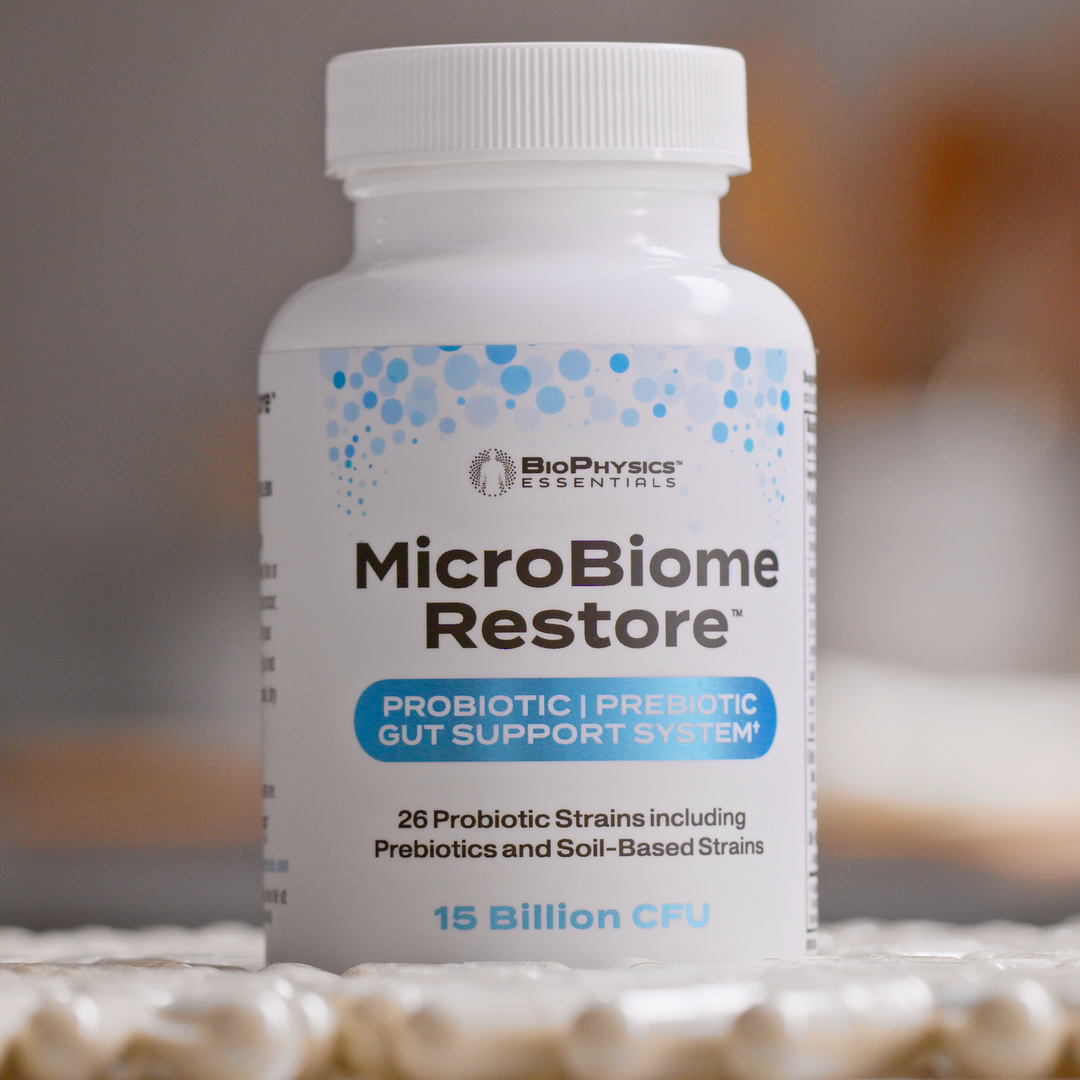
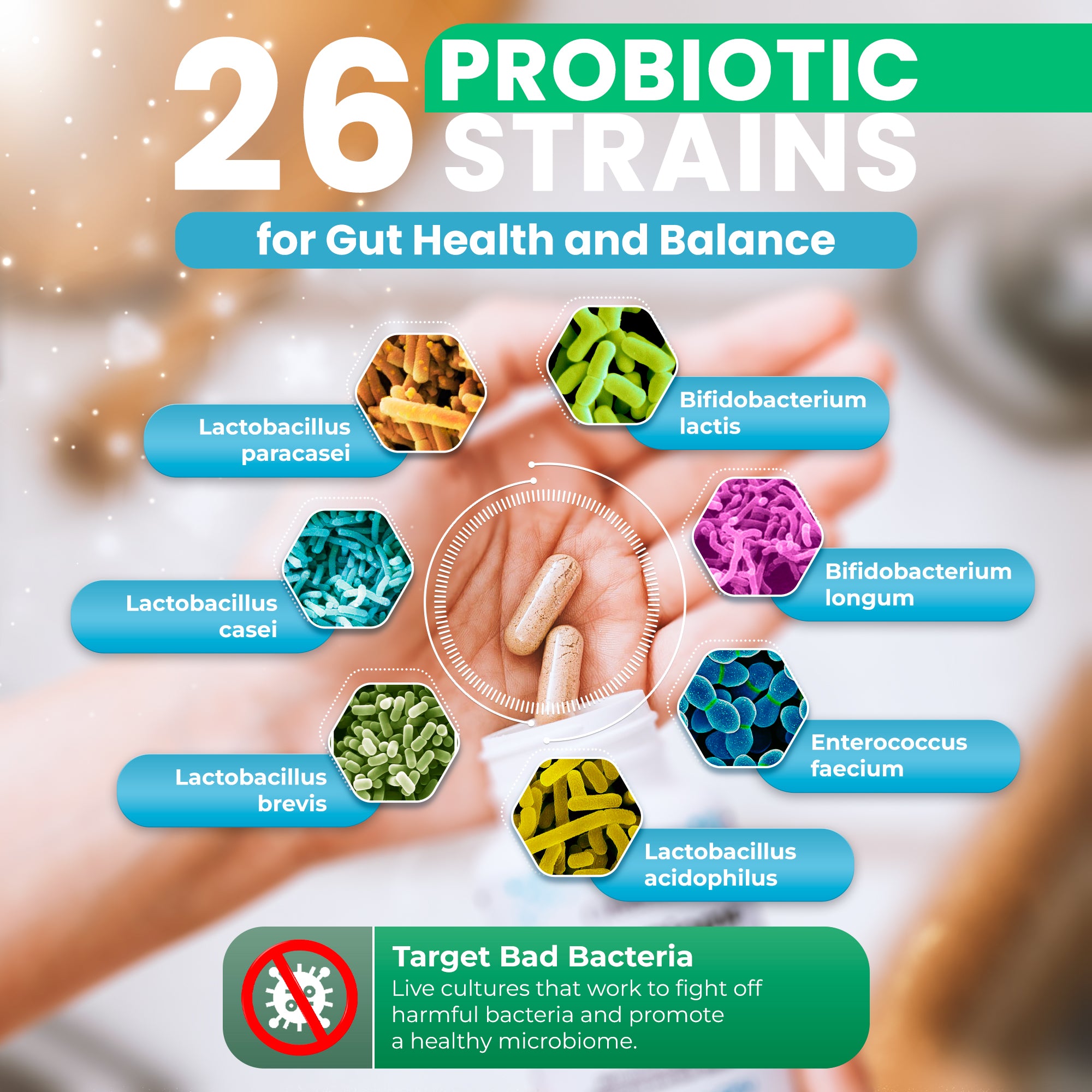
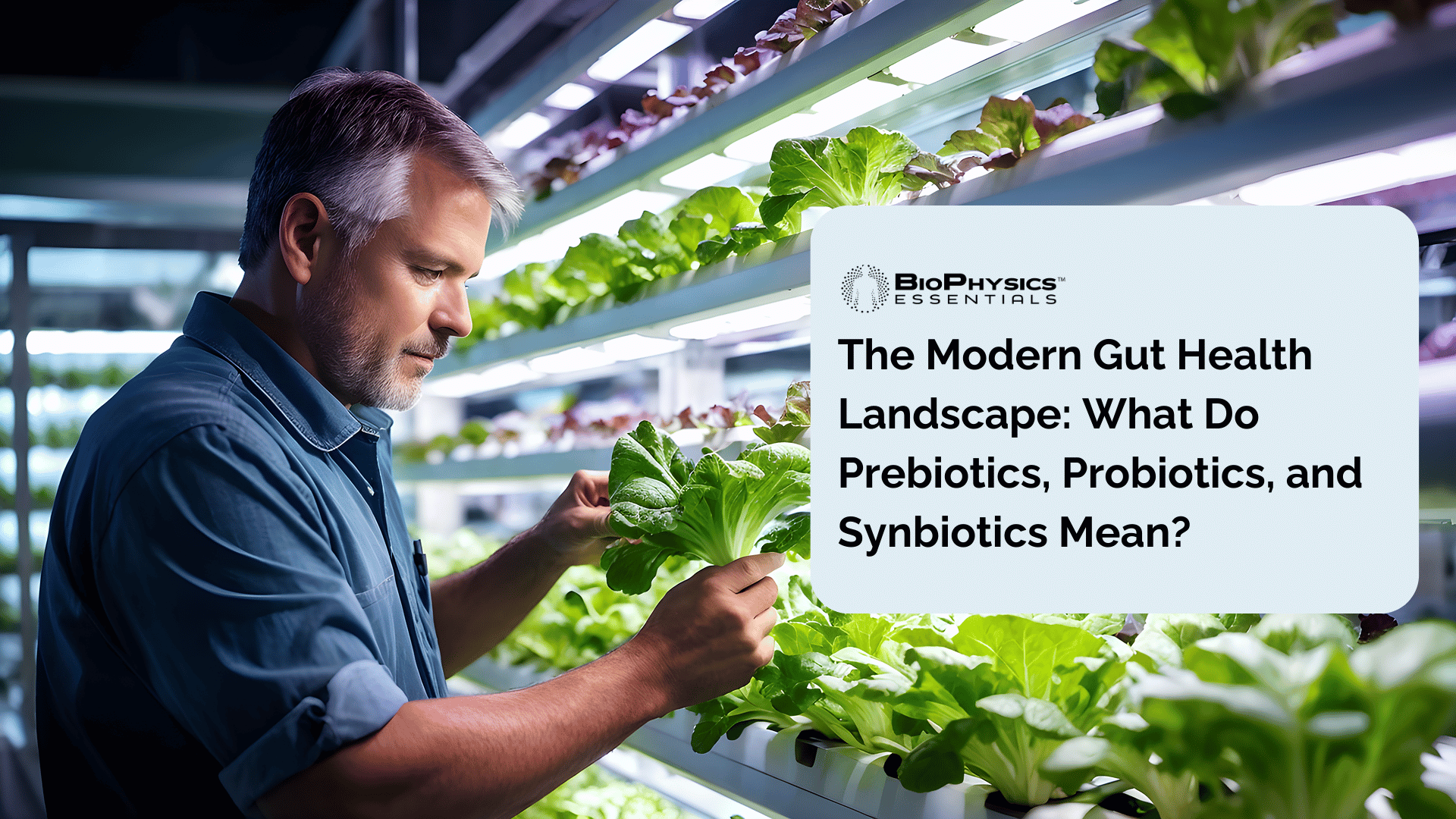




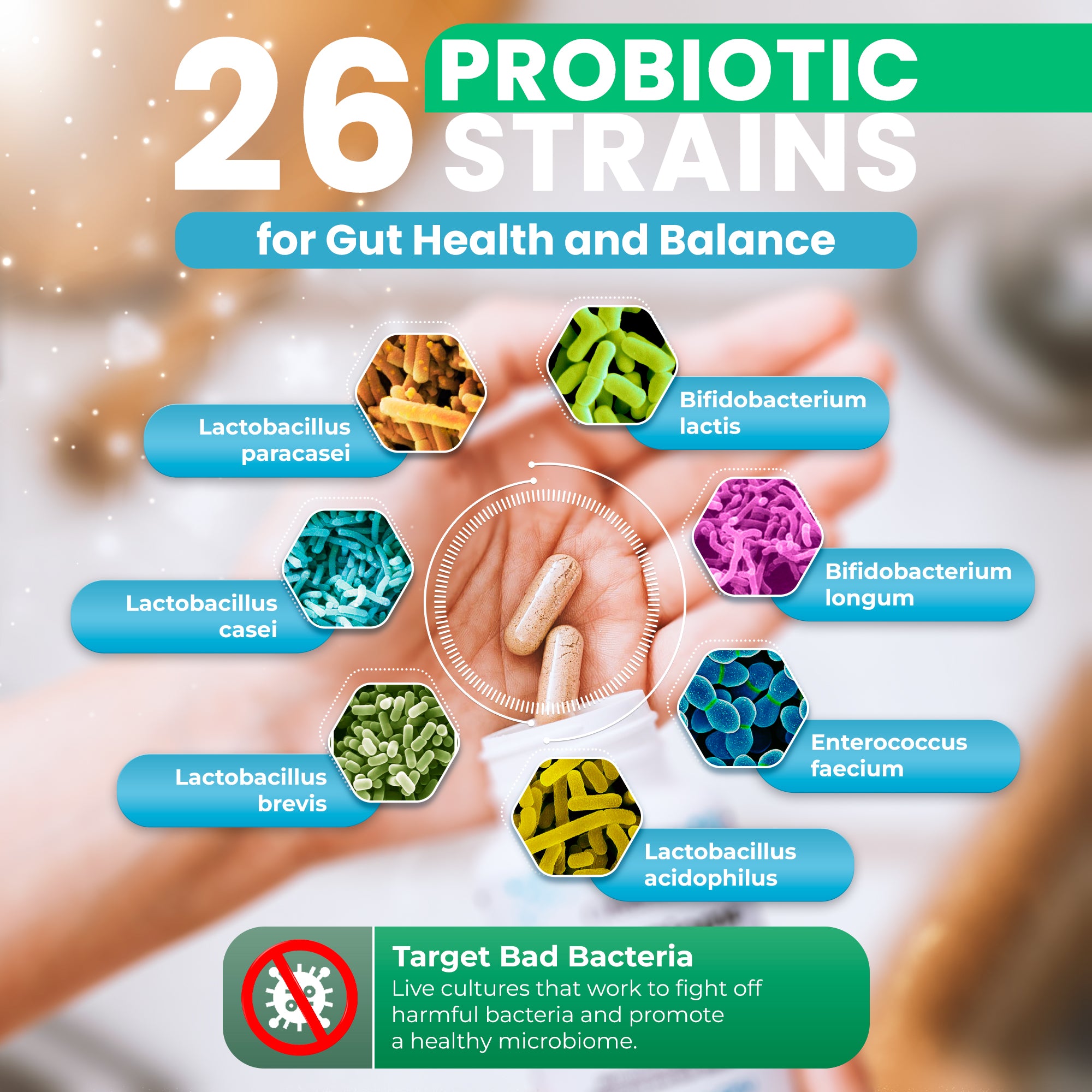
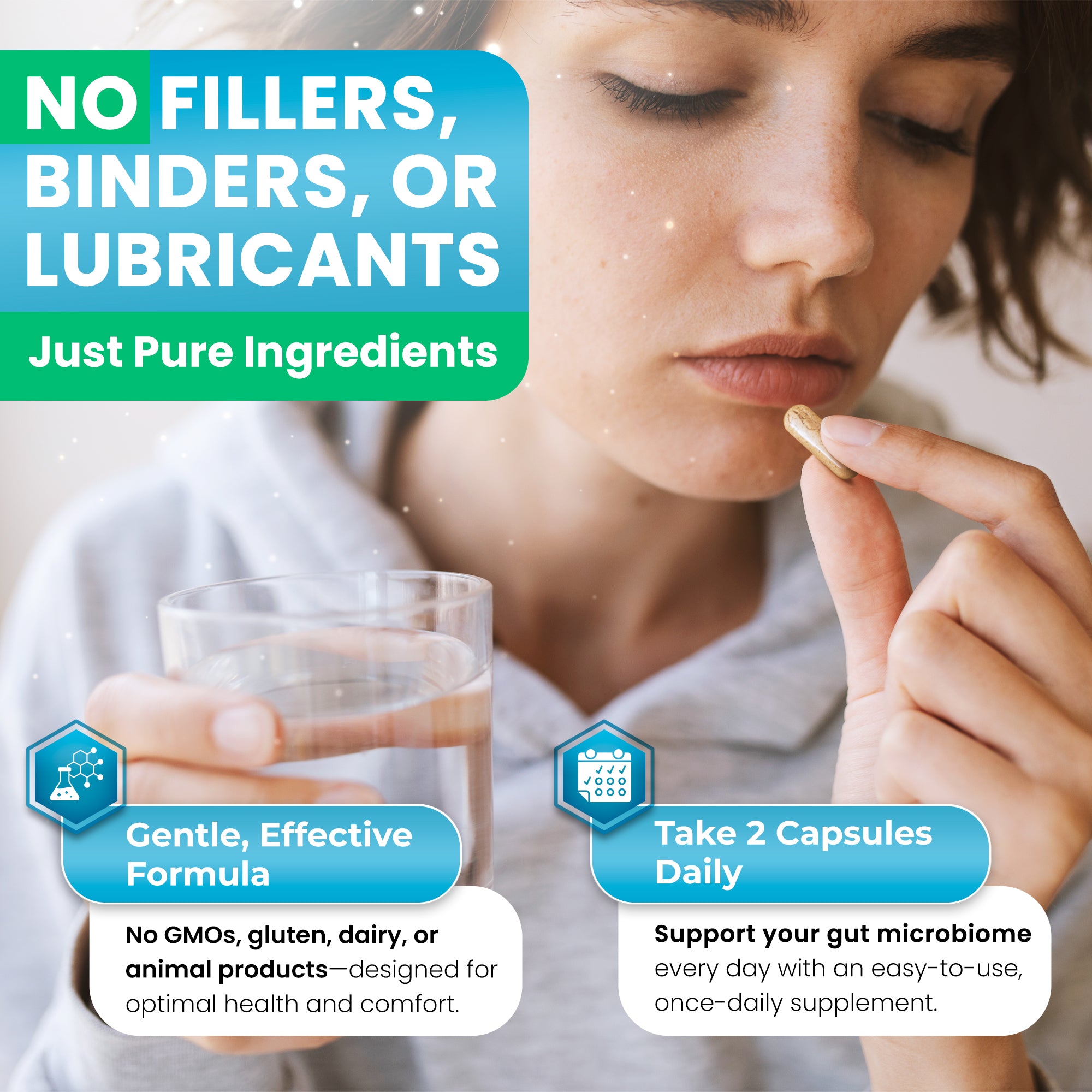
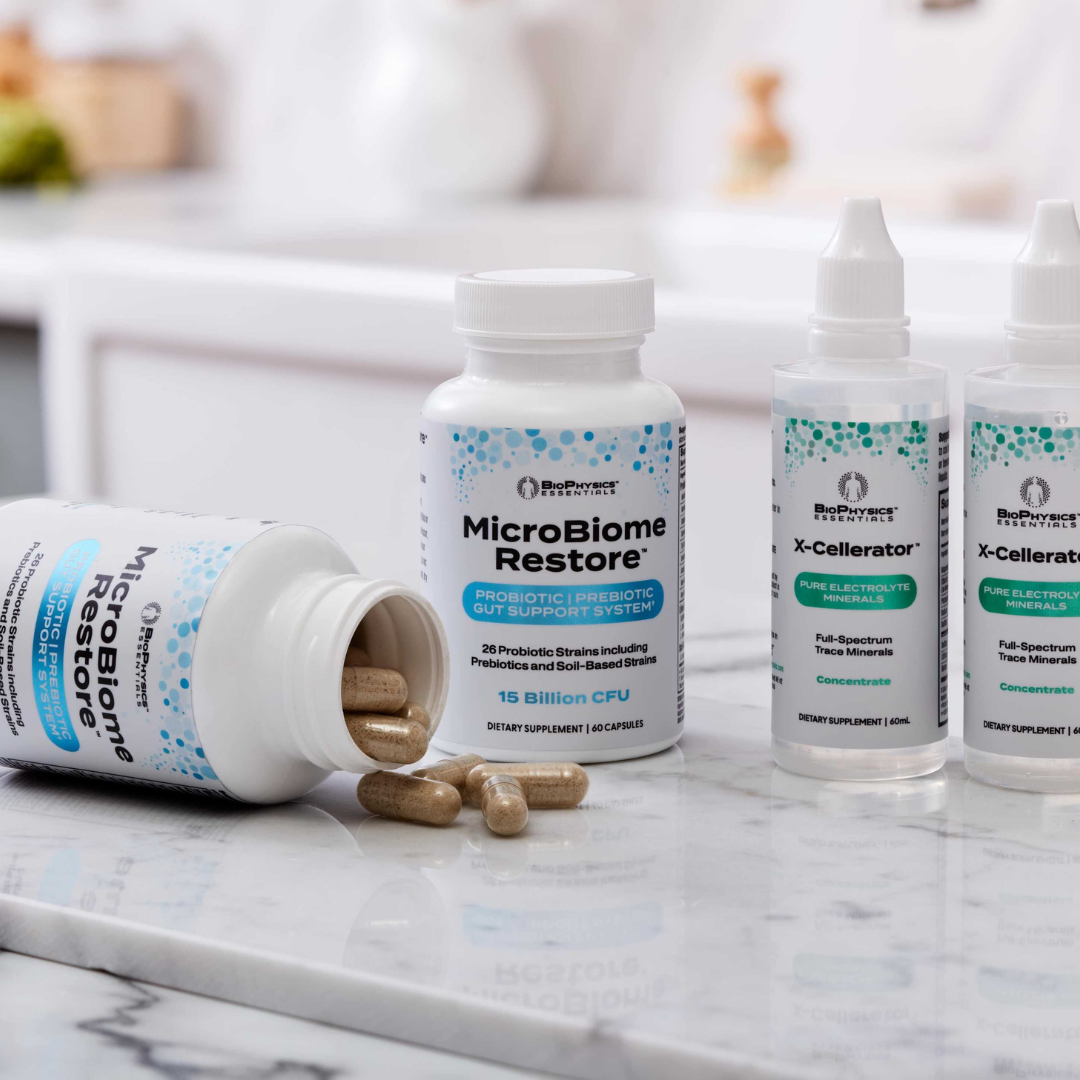
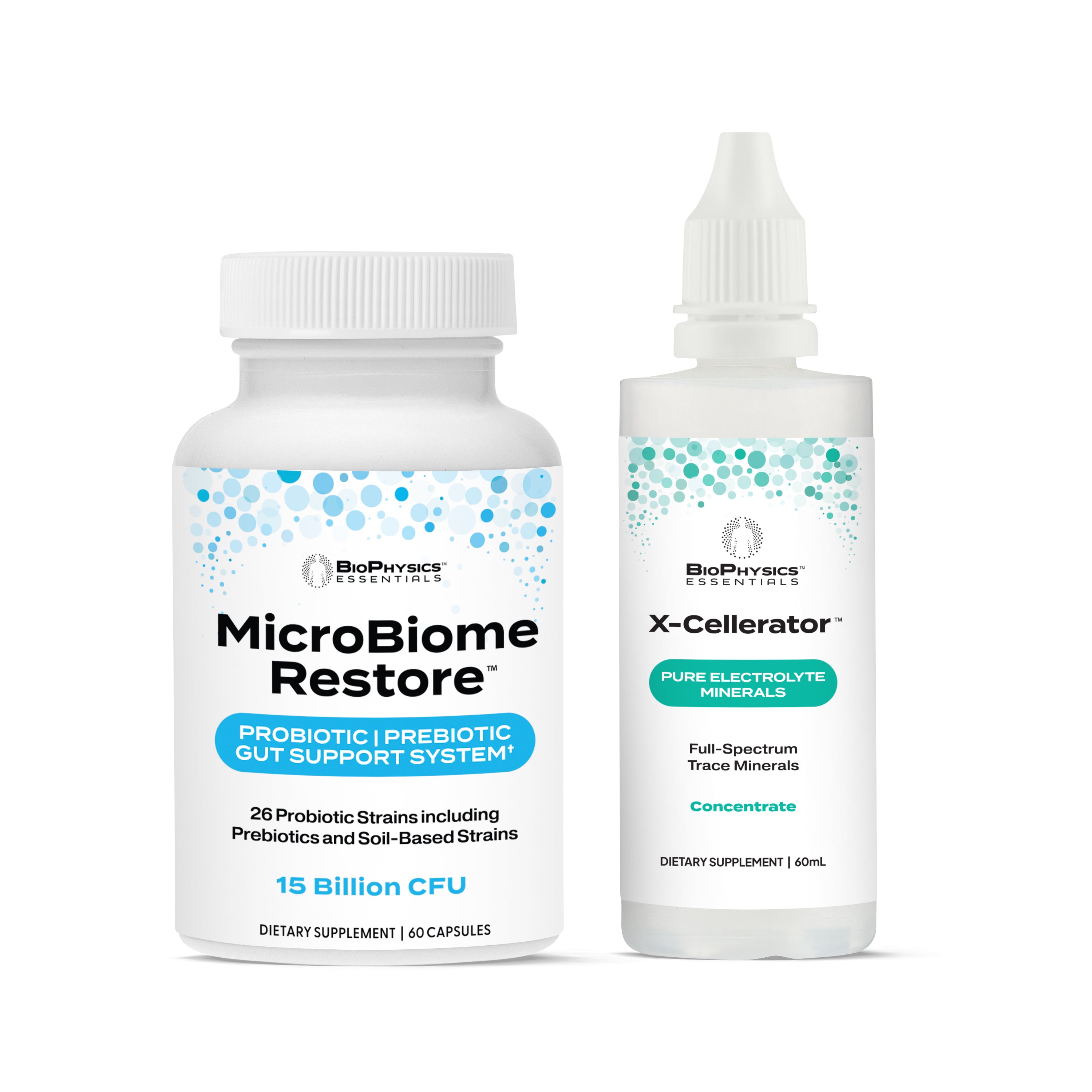


Share and get 15% off!
Simply share this product on one of the following social networks and you will unlock 15% off!